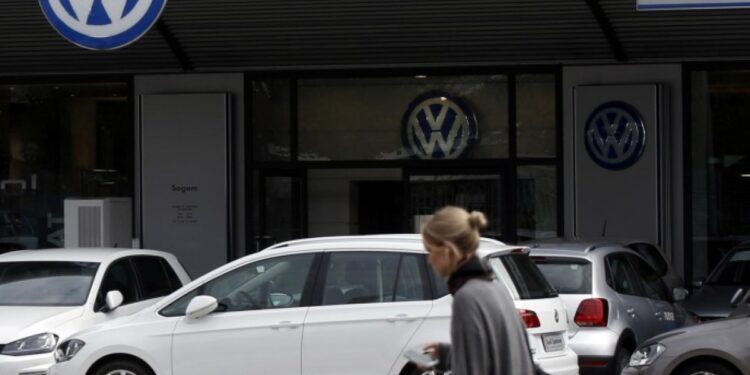European car manufacturers led by Volkswagen may have to buy carbon credits worth hundreds of millions of euros from Chinese electric car companies, such as BYD, to comply with strict EU emissions standards.
Purchasing carbon credits means purchasing certified units that represent the reduction or elimination of a specified amount of emissions of carbon dioxide or other greenhouse gases. Each carbon credit typically equates to one ton of carbon dioxide equivalent reduced or absorbed from the atmosphere through approved environmental projects.
Purchasing carbon credits aims to offset emissions, achieve carbon neutrality, and support environmental projects (such as tree planting and renewable energy projects).
According to a recent report published by the Financial Times, the sector faces a difficult choice; Pay large fines, lower prices for electric cars to boost sales, or buy credits from competitors.
Emissions regulations and compliance challenges
EU climate regulations require car manufacturers to cut emissions significantly or face heavy fines.
By 2025, carbon dioxide emissions must be limited to an average of 93.6 grams per kilometer across each company’s vehicles, according to the newspaper.
Any excess emissions would cost companies a fine of 95 euros ($98) per car for each excess gram. Given these limitations, many European companies struggle to achieve the desired goals on their own, prompting them to explore alternative solutions such as pooling.
Analysts point out that Volkswagen and Renault – two of the largest manufacturers in Europe – are most at risk. Volkswagen, in particular, needs to nearly double its electric vehicle sales within one year to comply with the regulations, a major challenge given that there is no major launch of a new electric model in its plans for 2025.
As for Renault, it is counting on offering an electric car at a price of 25 thousand euros ($25.7 thousand) to help it comply.
Accumulating carbon credits
Pooling is an EU-approved mechanism that allows manufacturers to balance their emissions figures with companies that have lower emission rates.
While the American Tesla has already managed to accumulate its credits with companies such as Stellantis, Ford, and Toyota, achieving more than two billion dollars globally in credit sales during the first nine months of last year, European companies are increasingly relying on their Chinese counterparts to conclude these agreements.
Volkswagen and Renault face limited options other than to collaborate with Chinese companies, such as SAIC and BYD, which have some of the largest portfolios available due to their high sales of electric cars in Europe.
UBS analysts point out that Volkswagen may need funds from several Chinese companies, as BYD alone may not have enough to cover the German company’s large deficit.
As for Mercedes-Benz, it has formed a pooling partnership with Polestar and Volvo, both of which are owned by the Chinese company Geely. With Geely founder Li Shufu owning about 10% of Mercedes, and the Chinese state-owned company BAIC owning another 10%, these alliances enhance Chinese influence in the European automotive sector.
Political and industrial reactions
The increasing reliance on Chinese companies for compliance has raised political concern, according to the Financial Times. MEP Jens Gieseke criticized the EU for allowing pooling with non-European companies, noting that this undermines the competitiveness of the local industry.
This concern is increasing after the European Commission’s recent decision to impose higher customs tariffs on Chinese electric car imports to protect the local industry.
In addition, the involvement of state-backed companies further complicates the situation, as the German state of Lower Saxony owns 20% of Volkswagen shares, while the French government owns 15% of Renault shares, making cooperation with Chinese companies a sensitive political issue.
Manufacturers’ response
While Renault has not yet decided on its final strategy, it has expressed reservations about clustering, warning that such arrangements could weaken the European auto sector in the long term.
As for Volkswagen, it said it aims to achieve compliance “through its own efforts” by expanding its fleet of fully electric cars. But she also added that when necessary, she would weigh the costs and benefits before resorting to pooling.
“The pace of our industry’s transformation is determined by market conditions and our customers,” Mercedes-Benz said, stressing its continued investment in electric vehicles.
Brussels is facing increasing pressure to reconsider its emissions policies, as sales of electric cars declined in Germany and France last year after governments reduced support for purchasing electric cars.
In response, EU Climate Commissioner Wopke Hoekstra recently met industry representatives to discuss potential policy adjustments, with further strategic dialogues planned over the coming months.
While Europe remains the continent with the fastest warming temperatures, due to its proximity to the North Pole, the tension between the imposition of environmental regulations and market reality will continue to affect the automotive sector.
The main question remains: Will European companies be able to overcome this crisis without losing further dominance to Chinese competitors?



